Supporting a young person with arthritis at school

Having arthritis as a young person can make aspects of school life very difficult. But there are several ways that you as a teacher or member of school staff can help, and you could be the difference that means your student is happy and successful at school.
They may need some changes to their routine and physical environment. For the school, these relatively minor changes should be straightforward to implement, but for the young person the benefits could be huge.
By law, schools are required to make sure that having a condition like arthritis doesn’t put a young person at any disadvantage to their peers in terms of accessing their school or learning. There is plenty of support available to help you make any reasonable adjustments, including the possibility of financial support.
Having a rare and long-term medical condition like arthritis can be an isolating experience for a young person and it will likely affect their mental health.
We have worked with some fantastic young people to create this comprehensive guide to help key staff understand how to ensure a young person with arthritis has a positive time at school and is able to achieve their potential. The quotes throughout are genuine ones from the young people we worked with.
Watch our School Series in English and Welsh
Click in the box of in the top right hand corner of the YouTube player to explore the rest of the playlist.
Healthcare/ Education Plan: English Healthcare Plan: Welsh
Order our free booklet in English Order our free booklet in Welsh
The importance of good communication

You’re not expected to be an expert in arthritis overnight. Having good two-way communication with the young person and their family is a great place to start.
If someone with arthritis is joining your school, invite them to look around and have a chat about how their condition affects them and what support they need. It’s important to keep this conversation going throughout their time at school.
It will help to write a care plan for the pupil, in consultation with the young person and their parents. These plans may have different names around the country, such as individual healthcare plan or individual education plan. The plan should contain information about their condition and medication, and how both could impact on their school life and education. It should set out the support they will need. It’s important the plan is kept up to date.
If you have access to one, your school nurse or community nurse should be able to help you write the plan, and you might be able to get input from the young person’s healthcare team. You could ask the parents if they can set this conversation up.
Your school may have its own care plan form, but we have a template with further information about JIA.
Ensuring that a wide range of teachers know about the young person and their needs can help. Problems have occurred in the past with staff outside of the young person’s core group of teachers, who weren’t aware there was a pupil with arthritis in the school.
Young people don’t like having to regularly tell adults about their arthritis and the problems it causes, so raising awareness among your colleagues would help avoid this.
Providing practical help and understanding will make a big difference, and it’s best if you can make any agreed changes subtly, as they won’t want to stand out from the crowd. They also won’t want sympathy or pity.
“Sometimes I've used up every single ounce of energy to simply get into school.”
What is arthritis in young people?
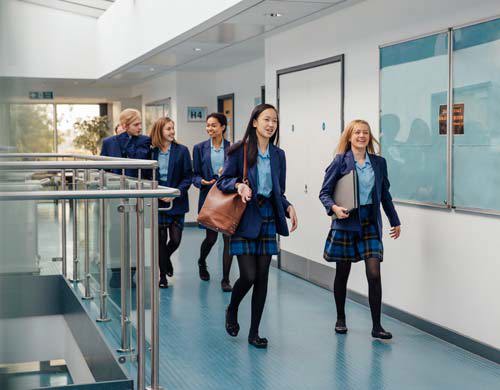
When children get arthritis, it’s called juvenile idiopathic arthritis (JIA). This is a long-term condition.
Juvenile means it was diagnosed before the age of 16. Idiopathic means we don’t know what caused it, and arthritis means inflammation in a joint.
In the UK, an estimated 10,000 children under 16 have JIA. The numbers of young people and adults living with JIA from 16 years of age is unknown.
It sometimes takes a while for a young person to get an official diagnosis.
The main symptoms of JIA are pain, swelling and stiffness in joints. Commonly affected joints include those in the hands, knees, elbows, back, and feet. At times it can be very difficult to move joints.
JIA is different from osteoarthritis, which affects around nine million people in the UK. Osteoarthritis tends to affect people from around the age 50 onwards, and is caused by mechanical changes and damage in a joint.
JIA is an autoimmune condition. The young person’s immune system is overactive and causes unnecessary and harmful inflammation in joints and elsewhere around the body.
Young people with arthritis often experience fatigue. This is an overwhelming tiredness that can’t be cured with sleep or rest. It can make it difficult for your pupil to concentrate and this is sometimes referred to as ‘brain fog’.
JIA is invisible and unpredictable. Your pupil may seem perfectly well one day, and then be stiff, exhausted, and in a lot of pain the next. The sudden worsening of symptoms is known as a ‘flare-up’ or ‘flare’.
“No day is the same; I may have a great, low pain day and feel like I can run a marathon, and the next day be unable to get out of bed due to the pain.”
Young people with JIA can get inflammation in their eyes, known as uveitis. This is treatable, often with the same drugs used to treat their arthritis. They may also need eye drops. Without treatment it can cause serious and permanent damage to eyesight, potentially even blindness. Uveitis could affect a young person’s eyesight in school.
Read more about the different types of JIA.
Other musculoskeletal conditions
There are other conditions that can affect young people’s joints, muscles, bones, and tendons – known as the musculoskeletal system.
Like JIA they can cause pain, stiffness, fatigue, isolation, and affect the young person’s mental health. Therefore, some of the content in this webpage should be helpful for your school when supporting a young person with one of these conditions.
Here is some top-level information and where you could turn to for further support.
- Lupus can cause inflammation in any part of the body. It’s an unpredictable condition that can cause lots of problems. Some of the more common symptoms are joint pain and swelling, skin rashes and fatigue. It can potentially cause inflammation in major organs, such as the kidneys, heart, lungs and the nervous system. For more information see: www.lupusuk.org.uk/lupus-in-young-people/.
- Myositis is the name for a group of rare conditions that affect the muscles. The main symptoms are weak, painful, or aching muscles. The main types of myositis are polymyositis, which affects many different muscles particularly the shoulders, hips and thighs, and dermatomyositis, which affects many different muscles and causes a skin rash. For more information see: www.myositis.org.uk.
- Scleroderma is when skin, either on the outside or the inside of the body, hardens like scar tissue. There are different types of scleroderma and the most common type that affects children is called localised scleroderma, which means that only the skin is involved. A very small number of children get systemic sclerosis, which can affect the skin and internal organs. For more information see: www.sruk.co.uk/scleroderma/scleroderma-children.
- Joint hypermobility is when someone has very flexible joints, which can cause pain and tiredness. It can affect balance and co-ordination and, in some cases, cause joint dislocations. Treatment involves improving muscle strength and fitness. For more information see the School Toolkit for joint hypermobility (JHS) and Ehlers-Danlos syndrome (EDS) and JHS: https://theshooltoolkit.org.
Medication for JIA and other conditions affecting the immune system
If it’s not treated, JIA can cause long-term damage to joints. Thankfully, there are many good drugs to treat JIA.
In JIA the problem stems from an overactive immune system. Therefore, many treatments work by suppressing the immune system. This is the same principle in treatments for lupus, myositis, and scleroderma, which are also autoimmune conditions.
Methotrexate is commonly given to children with arthritis, and this drug can greatly improve symptoms. But, it can make them feel very sick and exhausted.
Methotrexate is taken once a week and any side effects usually happen around the time it’s taken. So, your pupil may feel anxious and upset before they’re due to take it, and then feel poorly after they've taken it.
If a young person is experiencing side effects from their medication, they might need to take some time out in a quiet room, such as a school nurses’ office if you have one.
Drugs that suppress the immune system can make a young person more likely to pick up infections, which can then be more serious. This makes it important that your school practises good general hygiene procedures, and strictly observes the rule that children with sickness or diarrhoea stay off for 48 hours.
Chickenpox can be more serious for young people on drugs for arthritis. It’s important to let the young person and their family know straight away if there are any cases, especially if they may have been in contact with someone with chickenpox.
Some drugs, as well as the arthritis itself, can make the young person more sensitive to the sun. In the summer term, it’s important they wear sunscreen. Ask the parents if this is an issue. If so, you might need to remind them about this, or younger children might need your help.
If a drug isn’t treating their condition well enough, or is causing severe side effects, they could be taken off it and tried on something else. Therefore, your pupil could be on several treatments during their time at your school. They may be anxious when they change drugs, their condition might flare, or they could experience new side effects. Once someone is on the right drug for them, it can dramatically improve their health.
“Meds are awful. They mess with your guts and some days I might need to step out of class to pop to the bathroom, or to get some air.”
Our Conditions, Our Lives podcast
Our Conditions, Our Lives is a podcast for young people, by young people talking about Arthritis and related conditions and how it affects their lives.
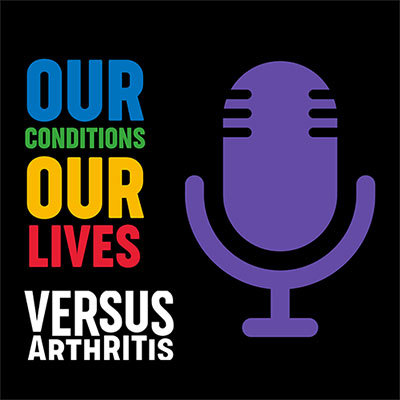
In this podcast you’ll hear from young people of all different ages across the United Kingdom with different musculoskeletal conditions.
They share personal stories, what they’ve learned on their journeys so far and where they want to go next.
These young people have come together with the help of the young people and families service at Versus Arthritis to have their voices heard and connect across the nation.
Listen to the Our Conditions, Our Lives podcast
Getting around school
Arthritis can affect a young person’s ability to walk. They may find it difficult to get around school and feel vulnerable in busy corridors or on stairs. At times they may need to use crutches or a wheelchair. They will probably find it difficult to carry heavy bags.
If a young person with arthritis is struggling to walk between lessons in good time, it would be useful to have a gentle private chat with the pupil to look for solutions. Young people can get upset if they can’t keep up with their peers and get embarrassed coming into lessons late.
“My school is very spread out, so I will often be doing around 11,000 steps a day or more – which is super challenging to say the least! Having to walk this much between lessons is very painful and will often tire me out, which means that I will be less focused in the lessons as I am exhausted.”
The following measures have helped young people with arthritis:
- Schools have designed timetables to limit the amount of walking the student has to do and ensure they avoid busy corridors and stairs.
- Having one or two friends always accompany the pupil around school gives them practical and emotional support.
- Being able to leave books and equipment in a locker or classroom located near their classes.
- Having permission to leave class a few minutes before the end of a lesson, to help them get to their next lesson.
- Flexibility with uniform, such as wearing trainers that provide comfort and support.
- Being given passes to get around the school during lesson times.
- Being able to use a lift, if there is one in school.
- Handrails on both sides of stairs.
- Having duplicate books, so they can leave some at home and some in school.
- Digital resources for schoolwork, so they don’t have to carry books around.
“Being able to arrive to lessons 5 minutes late meant I could use a quieter set of stairs and avoid being trampled.”
Difficulty writing
JIA can affect young people’s hands and wrists. This can make writing even small amounts difficult and painful.
“I always feel pressured to keep up in lessons and when the class is finished writing I am still going and can’t relax.”
Some solutions young people told us about:
- Notes being available at the start of a lesson, so they don’t have to write everything down.
- Having a laptop, tablet or a similar device to work on.
- Taking photos of notes on a board.
- It would help if the young person faces the front of the class, so they don’t have to twist around to see things.
- Pencil or pen grips.
- Keeping the amount of writing to a minimum and if they have to write, giving them regular breaks.
- A sloped desk might help the young person, because the angle means they won’t have to lean over. Good overall posture when they are writing is important.
- Managing how much homework they are given, particularly written, so they don’t have too much to do in one go. Could a parent or another family member be a scribe for their homework if a task requires writing?
“Doing a lot of writing can cause issues and lead to me being out of action for days.”
Pain and stiffness
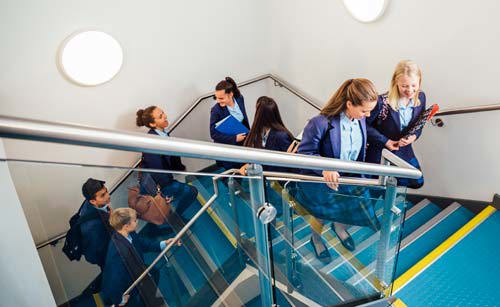
“When I am in pain sometimes it makes it harder for me to concentrate, so some fresh air would help.”
Pain and stiffness are among the most common and difficult challenges for a young person with arthritis.
Sitting still for too long is not good for someone with arthritis. It will help if they can get up, stretch, and walk around regularly. However, the young person may feel self-conscious doing this.
Talk to the young person about how they think this could be incorporated into lessons and into their day. The following might help:
- The young person being given errands to do, such as taking something to the office or to another teacher.
- Having a subtle and agreed way for the young person to let teaching staff know they’re in pain, maybe a card they could pass to the teacher, putting a badge on, or placing a particular item on their desk.
- Teachers could ask the whole class to stand up, move around and stretch at regular intervals to avoid the young person with arthritis feeling singled out and embarrassed. After all, it’s good for everyone to move around regularly.
Some school chairs might be uncomfortable for a young person with arthritis, particularly if they are small and hard. Sitting on the floor can be painful and difficult, and stools without back rests, such as those often in science labs, can cause problems.
Talk to the young person about seating arrangements and what chairs are comfortable for them. Talking to the young person’s occupational therapist about this, as well as other aspects of school life, would help. Ask the parents if they can set up this conversation.
“I struggled to sit on the stools in the science lab. I used to be quite sore after sitting on those.”
Pain and stiffness from arthritis is often worse in the mornings and some days your pupil may struggle to get in on time. They might find morning lessons difficult.
“I might be laughing and joking with my friends but the next minute I could be in pain.”
Cold environments can cause problems for young people with arthritis, as the cold can make pain and stiffness worse. Talk to your student about ways to avoid this being a problem.
There may be things the young person likes to do if they’re in pain. Talk to them and see if they can be accommodated. It might be they need to take some pain medication or rub pain relief cream into a joint and sit in a quiet room. Working out a plan for taking pain medication during school hours will be important.
“My Head of Year always made sure to check up on me, and if ever I told him I was in pain he would always see if I needed anything or he’d arrange help to get me home.”
Fatigue and brainfog at school
Overwhelming tiredness, or fatigue, is very common among young people with arthritis. The psychological aspects of this on a young person can’t be underestimated.
Young people also talk about ‘brainfog’ when they’re unable to concentrate. They can feel detached from what is going on around them.
“If you ask me a question when I have brainfog, you're most probably not going to get a very good answer.”
Having arthritis can make it difficult for a young person to get enough sleep, which can further affect concentration levels and mood.
If their fatigue is bad, the young person may need to rest in a quiet room. There’s no cure for fatigue, but good understanding, kindness, and trying to accommodate the young person’s proposed solutions will help.
PE and sports
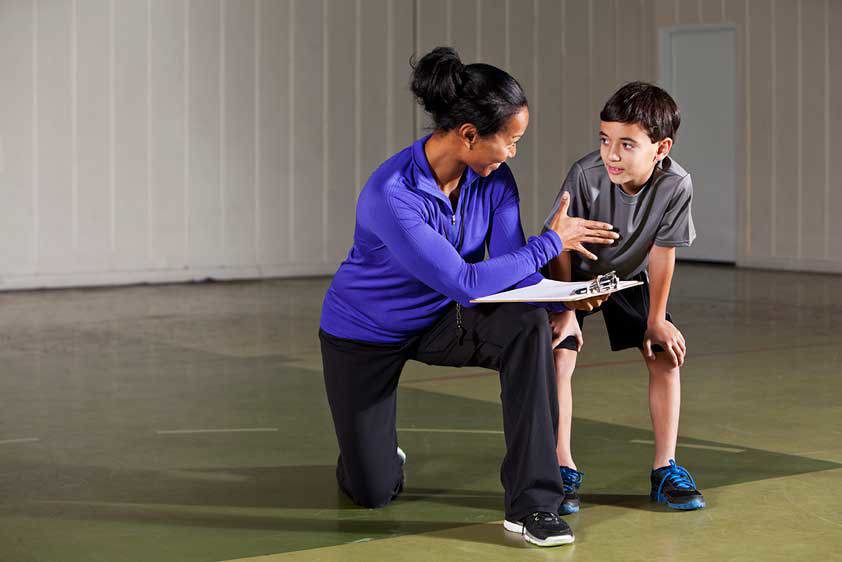
“I was given physiotherapy exercises from the hospital to help with hypermobility and JIA. My parents let the school know and my PE teacher worked my physio exercises into the warm up and warm down sessions. None of the other pupils knew so I didn’t feel singled out as it was something we could all do. It really helped me feel included and it meant I was getting the exercises done as well.”
Many young people with arthritis have told us about problems they’ve had with PE lessons. Sometimes they might not be able to do everything their classmates can. For example, physical contact sports and exercise in the wet or cold might not always be possible.
They might feel nervous and embarrassed at the prospect of doing physical activity in front of their classmates.
Young people with arthritis have told us they want to take part in PE whenever possible, at a level appropriate to them.
PE lessons can and should be positive experiences for a young person with arthritis and there are lots of ways that PE can be accessible to them. The best approach will involve talking to the young person to find out what is and isn’t possible.
“PE was all or nothing. It was aimed at people with high level ability. I'm not going to be able to play rugby on a cold day. It could be lashing down with rain, and everyone had to go outside. If I tried to join in, I felt embarrassed if I couldn’t do it and I had to stop. I used to dread going to PE each week.”
Physical activity is a key aspect of managing arthritis well. For example, having strong muscles can take the strain off a joint affected by arthritis. The right type of exercise can help a young person stay flexible and have a good range of movement in their joints.
A young person’s arthritis can vary greatly from day to day. On days they can’t do PE, it would be kind to make sure they know they’ve not done anything wrong and not draw attention to them.
An understanding PE department could be a huge help to a young person with arthritis.
It would be good to make sports days accessible for all, and not put pressure on young people with arthritis to do more than they’re capable of.
"I remember having to choose five events I had to compete in at sports day – this wasn’t optional. Sometimes people with JIA can struggle with some sports. I performed really poorly which was embarrassing in front of so many people!”
Watch our short film on physical education:
Time off school and keeping up with work

Young people with arthritis will probably miss more school days than their peers, due to medical appointments and their condition in general.
If the young person has a bad flare up of symptoms, they might need a prolonged length of time off school.
Missing school can cause a huge amount of anxiety and worry, as well as affecting their education.
“When I am home from school with a flare up it’s not because I don’t want to be in school, I genuinely cannot move.”
Anything and everything you can do to help a young person keep up with their schoolwork will be greatly appreciated. The following will help:
- Communicate regularly with the young person, and make sure they have all lesson notes.
- Extend internal school deadlines where possible.
- Set the young person up with a remote learning provision plan at the beginning of term, in case they are unexpectedly off school suddenly for a length of time.
- Have an attendance awards scheme that doesn’t penalise missed days due to medical conditions.
- Talk to the young person before they are due to return to school, to agree a plan and address any concerns.
“At school I would change the pressures on attendance. People would always get prizes for 100% attendance, and I’d get automated letters sent saying they were concerned about my attendance. This made me feel worse as I’d really struggle with missing school anyway and would always try to be in even when really unwell, so this made that effort feel like nothing.”
Mood and mental health
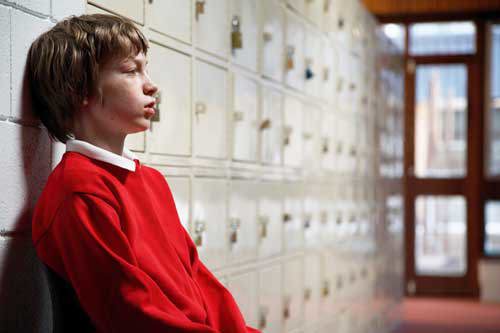
“It isn't just physically exhausting being in constant pain; it's mentally draining too.”
Unsurprisingly, a lot of young people with arthritis will experience a range of feelings such as anger, fear, isolation, depression, and anxiety.
Pain, fatigue, side effects of medication, and not being able to do everything their peers do, is a lot for young people to deal with. And having a rare condition like arthritis as a young person can be a lonely experience.
There is evidence that stress and worry can cause flares of JIA. It will help if you regularly check in with them, try to relieve any pressure, and be there to help and support in any way they want you to. It can be a massive help for them to have a nice, understanding, and supportive friendship group, so it’s worth keeping a discreet eye on that side of their school life.
The Anti-Bullying Alliance offer support and resources for schools: https://anti-bullyingalliance.org.uk
Young people living with long term health conditions are more likely to have mental health needs. Some young people will be able to access specialist support through their healthcare teams, but this isn’t available in every area or there may be long waiting lists. Young people might find it helpful to have a trusted staff member in the school they can talk to when needed. Maybe the school could help with access to a counsellor or a psychologist, if the young person and their parents want that to happen. Early intervention and support to tackle issues like bullying are very important.
Watch our short film on YouTube about the impact of arthritis on the mental health for young people
Arranging school trips
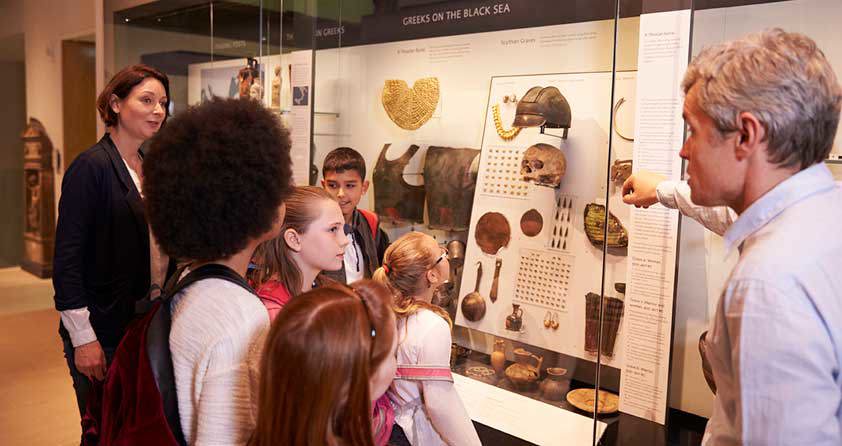
When arranging a school trip, try to carefully consider the needs of the young person with arthritis.
If you can, visit the area prior to the trip to reduce any risks and look at access into and around the venue.
Speak with the young person and their parents to tell them about the timetable and find out what they hope to get involved with.
Make sure you know all about the medication they need to take, as well as how it needs to be stored.
Be creative with the activities and try to make the young person feel like they're not missing out. If there are physical activities, such as long walks or rock climbing that the young person might not be able to do, plan alternatives.
Make sure any transport is comfortable and plan regular breaks on journeys. The accommodation should have good access and possibly either bedrooms on the ground floor or lifts if needed.
Let the staff at the venue and any instructors know you have a student with arthritis. They may be able to provide alternative arrangements or equipment.
Exams and coursework
Some young people may need special consideration for exams, such as extra time or the use of a computer or scribe. This may require the student being in a separate room under exam conditions.
These accommodations need to be requested well in advance from the relevant examination board. The young person’s rheumatology team may be able to provide a letter of support.
If the young person finds writing and typing difficult, they may struggle with coursework. Talk to them about this in plenty of time before deadlines and see if there’s anything they need that the school can provide. Speech recognition software on a laptop, tablet or similar device may help.
Career aspirations

Your student might need some extra support and empowerment when thinking about career options. Statistics show that while young people with arthritis often do above average in education, they sometimes find it difficult to get their first job.
There’s a great deal that the school can do to boost the young person’s confidence and aspirations. Early work experience which matches their strengths and ensures success can:
- boost their self-confidence
- improve their CV
- help them realise their strengths and any areas for development
- give them realistic insight into the world of work.
Good careers advice for young people with arthritis will be a realistic and positive focus on what they can do, rather than what they can’t do.
Encouraging the young person to be ambitious and confident is important. There will be life skills that the young people will have developed through managing their condition that many of their peers won’t have – these may include:
- being organised
- being determined to overcome challenges and obstacles
- showing resilience
- thinking creatively to avoid or overcome problems.
It would be good to stress to the young person that these are skillsets that could be transferrable to the world of work which they could tell future employers about.
You can find helpful tips and guidance on starting work in our workplace guide for young people.
Expert help and support for your school
The physical limitations arthritis causes a young person can impact on their ability to learn, which means they can be considered as having a special educational need. Therefore, it will help to get your special educational needs co-ordinator involved.
It might be possible to talk to the young person’s rheumatology team, such as a specialist nurse, physiotherapist, or occupational therapist. The parents may be able to set up such a conversation.
Your school nurse may be able to help or put you in touch with relevant professionals. For example, every local authority in the UK should have a community paediatric occupational therapist. It might be worth seeing if you can invite them into your school.
It will probably vary around the UK as to which healthcare professional will be able to help you, and it may at times feel like such external support isn’t apparent. Be persistent and talk to your school nurse and anyone else who may be able to help.
Please always remember that trained and experienced staff in the Versus Arthritis Young People and Families Service are on hand to offer support and advice. You can email them at: ypfsuk@versusarthritis.org
You can be the difference

Life at school, just like life in general, can at times be tough for a young person with arthritis.
One of the worst things for any young person is to feel different from their peers. Arthritis can cause a sense of isolation, exclusion, and loneliness that can be just as bad, if not worse, than the pain, stiffness and fatigue.
Keeping up good two-way communication throughout your pupil’s time with you, means that you can tailor the support and care to their unique needs.
With the right support and understanding, having arthritis shouldn’t stop anyone from achieving their full potential and thoroughly enjoying their time at school. You could make that difference for your pupil.
What the law says and further information about making reasonable adjustments

Schools are legally required to support young people with arthritis, so that their condition doesn’t put them at any disadvantage to their peers in terms of access to school buildings or the opportunity to reach their full potential with their studies.
To achieve this, schools are required by law to make any reasonable adjustments necessary to help young people overcome barriers caused by their condition.
This is covered under the Equality Act 2010 in England, Scotland and Wales; and the Special Educational Needs and Disability Act (Northern Ireland) 2016. Under these laws, arthritis is classed as a disability.
It’s the responsibility of governors to ensure that schools have the means to fulfil that duty, and to make sure they are meeting these obligations.
There is statutory guidance for school leaders and governors from each of the four nations within the UK that sets out legal requirements for supporting a pupil with a medical condition.
- Supporting pupils with medical conditions at school, applies to England, December 2015. Visit: www.gov.uk/government/publications/supporting-pupils-at-school-with-medical-conditions--3
- Supporting children and young people with healthcare needs in schools – published by The Scottish Government, December 2017. Visit: www.gov.scot/publications/supporting-children-young-people-healthcare-needs-schools/documents/
- Supporting learners with healthcare needs – published by the Welsh Government, March 2017. https://gov.wales/supporting-learners-healthcare-needs-1
- Supporting Pupils with Medication Needs Guidance, from the Department of Education in Northern Ireland, February 2008. Visit: www.education-ni.gov.uk/publications/supporting-pupils-medication-needs
In England, Ofsted inspectors will assess how well a school supports pupils with a medical condition as part of its assessment of a school’s safeguarding standards.
In Wales, Estyn inspectors will consider the effectiveness of the school’s policies, procedures and arrangements for meeting the needs and welfare of children with medical conditions as part of its assessment of a school’s safeguarding standards.
In Scotland, members of an Inspection team assess approaches to safeguarding which may include how well a school supports children and young people with medical conditions. This might include the extent to which reasonable adjustments have been made to support and safeguard learners.
In Northern Ireland, the Educational Training Inspectorate will consider the effectiveness of the school’s policies, procedures and arrangements for meeting the needs and welfare of children with medical conditions as part of its assessment of a school’s safeguarding standards.
With this information page we aim to provide ideas of the types of reasonable adjustments you could discuss with your pupil and their family to help them achieve their best.
Download a copy of the Individual Healthcare/ Education Plan here